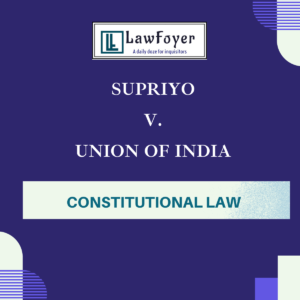A) ABSTRACT / HEADNOTE
This case addresses a critical legal issue concerning the interplay between civil and criminal jurisdictions in disputes involving negotiable instruments. The appellant, Prem Raj, faced criminal charges under Section 138 of the Negotiable Instruments Act, 1881, after a cheque issued by him was dishonored. Concurrently, the appellant succeeded in a civil suit declaring the cheque as a security instrument. The Supreme Court ruled that the criminal proceedings, being contrary to the findings in the civil suit, were unsustainable, reiterating that civil court decisions bind criminal courts in such contexts.
Keywords: Dishonor of Cheque, Civil and Criminal Jurisdiction, Section 138 NI Act, Legal Enforceability, Security Instrument.
B) CASE DETAILS
- Judgment Cause Title: Prem Raj v. Poonamma Menon & Anr.
- Case Number: Criminal Appeal No. 1858 of 2024
- Judgment Date: April 2, 2024
- Court: Supreme Court of India
- Quorum: Hon’ble Justices Sanjay Karol and Aravind Kumar
- Author: Justice Sanjay Karol
- Citation: [2024] 4 S.C.R. 29; 2024 INSC 260
- Legal Provisions Involved: Negotiable Instruments Act, 1881, Section 138.
- Judgments Overruled by the Case (if any): None.
- Case is Related to Law Subjects: Criminal Law, Civil Procedure, Negotiable Instruments Law.
C) INTRODUCTION AND BACKGROUND OF JUDGMENT
The case emerged from the appellant issuing a cheque, which the respondent alleged was towards repayment of a debt. The cheque was dishonored due to insufficient funds and a “stop payment” instruction. While the criminal trial convicted the appellant, the civil court adjudicated the cheque as a security instrument and granted relief to the appellant. This conflict raised a question: whether concurrent civil and criminal proceedings could exist on the same transaction when the civil decree contradicted criminal findings.
D) FACTS OF THE CASE
- The appellant borrowed ₹2,00,000 from the complainant.
- He issued a cheque dated June 30, 2002, drawn on South Indian Bank, for repayment.
- The cheque was dishonored due to insufficient funds and a “stop payment” directive.
- The respondent issued a legal demand notice on December 22, 2002.
- The appellant neither honored the cheque nor responded to the notice, prompting the respondent to initiate criminal proceedings under Section 138 of the Negotiable Instruments Act, 1881.
- Concurrently, the appellant filed a civil suit to declare the cheque a security instrument, seeking prohibitory relief.
- The civil court decreed in favor of the appellant, while the criminal trial and subsequent appellate courts convicted him.
E) LEGAL ISSUES RAISED
- Can criminal proceedings under Section 138 of the NI Act proceed when a civil court has declared the cheque as a security instrument?
- Is the decision of a civil court binding on criminal courts in cases involving overlapping facts?
F) PETITIONER/APPELLANT’S ARGUMENTS
- Precedence of Civil Judgments: The appellant argued that the civil court’s decree declaring the cheque a security instrument barred criminal liability under Section 138 of the NI Act.
- Conflict Between Jurisdictions: He relied on precedents such as K.G. Premshanker v. Inspector of Police (2002) 8 SCC 87, asserting that civil court findings are binding on criminal courts.
- Absence of Legal Debt: The cheque was issued as security, not for repayment, negating the precondition of a legally enforceable debt under Section 138.
G) RESPONDENT’S ARGUMENTS
- Cheques and Presumptions: The respondent emphasized the statutory presumption under Section 139 of the NI Act that cheques represent a debt or liability unless rebutted.
- Parallel Proceedings: The respondent maintained that criminal and civil proceedings can coexist under Indian law, as observed in Iqbal Singh Marwah v. Meenakshi Marwah (2005) 4 SCC 370.
- Factual Discrepancies: The civil decree did not alter the reality of the dishonored cheque, rendering criminal prosecution valid.
H) RELATED LEGAL PROVISIONS
- Section 138, Negotiable Instruments Act, 1881: Penalizes dishonor of cheques due to insufficient funds.
- Section 139, Negotiable Instruments Act, 1881: Presumes the existence of a debt or liability in favor of the payee.
- Civil Procedure Code, 1908: Governs the procedural aspects of the civil suit filed by the appellant.
I) JUDGMENT
a. Ratio Decidendi
- Civil court decisions are binding on criminal courts when both jurisdictions adjudicate the same issue involving the same parties.
- The criminal proceedings were unsustainable as the civil court had decreed the cheque to be a security instrument.
b. Obiter Dicta
- Concurrent proceedings in civil and criminal jurisdictions must not lead to contradictory outcomes, necessitating a hierarchical precedence.
c. Guidelines
- Courts must carefully evaluate the findings in civil proceedings before adjudicating criminal cases involving overlapping facts.
- In cases of conflicting decrees, civil court decisions regarding the nature of a transaction should take precedence.
J) CONCLUSION & COMMENTS
This judgment reaffirms the binding nature of civil court findings in criminal proceedings involving identical facts. It underscores the principle of legal certainty and fairness, ensuring that parallel legal systems do not render contradictory verdicts. The ruling also provides clarity on the presumption of enforceability under Section 139 of the NI Act, which remains rebuttable by cogent evidence.
K) REFERENCES
-
Case Laws:
- K.G. Premshanker v. Inspector of Police & Anr. (2002) 8 SCC 87.
- Iqbal Singh Marwah v. Meenakshi Marwah (2005) 4 SCC 370.
- M.S. Sheriff v. State of Madras AIR 1954 SC 397.
-
Statutes:
- Negotiable Instruments Act, 1881.
- Civil Procedure Code, 1908.

